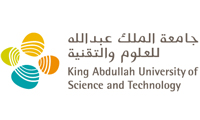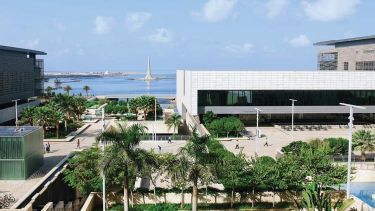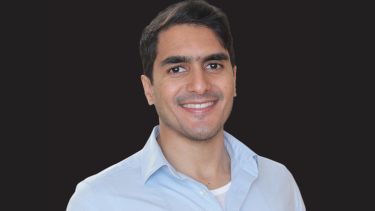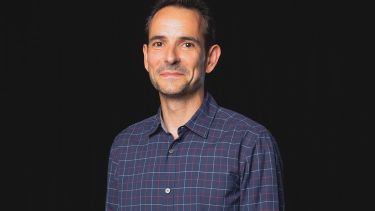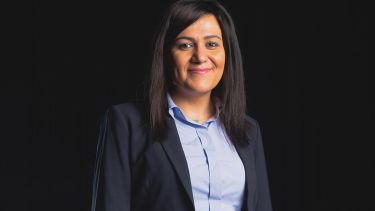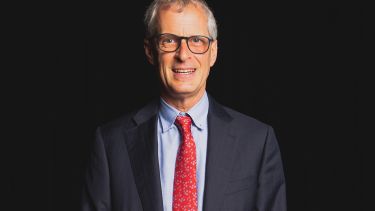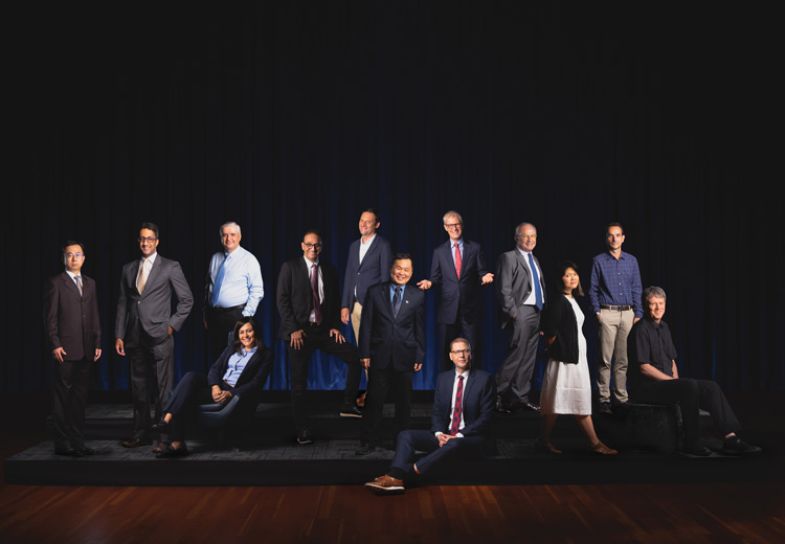
The Saudi Arabia-based institution is working to position itself as a beacon of science and technology research
Pictured above: KAUST faculty (L-R) – Yu Han, Mani Sarathy, Mohamed-Slim Alouini, Niveen Khashab, Mohamed Eddaoudi, Stefaan De Wolf, Boon Ooi, Magnus Rueping, Mark Tester, Pierre Magistretti, Peiying Hong, Jorge Gascon, and Havard Rue. Not pictured: Husam Alshareef, Osman Bakr, Carlos Duarte, Matthew McCabe, Omar Mohammed, Carlos Santamarina, Xianglang Zhang.
A thousand years ago, the Middle East was home to the House of Wisdom, says Professor Lawrence Carin, provost at King Abdullah University of Science and Technology (KAUST). It was a celebrated place of learning and scientific thinking, and its scholars’ research informed development throughout the rest of the world. The university continues to occupy this position today, thanks to the work of its faculty.
“KAUST aims to represent that House of Wisdom, working with some of the finest scientists in the world on some of the biggest problems facing humanity,” Carin says. Through impactful, highly cited research, scientists working at KAUST are having a real-world impact that extends from the local to global.
“KAUST was founded to create a leading science and technology research university in the Middle East, with the potential to transform the region,” Carin says. The university is already the top-ranked institution in Saudi Arabia in terms of quality research output, and sits in the top 120 globally, according to the 2020 Nature Index. However, it does not plan to rest on its laurels, and continues to attract experienced staff to its ranks. Carin, who recently joined KAUST from Duke University in the US, brings a wealth of experience to his role and understands the importance of quality research.
As one of the world’s top researchers in computer science with a particular focus on artificial intelligence (AI), Carin will drive the university’s AI research agenda. “We anticipate that KAUST will play a vital role in developing data science and AI expertise in the region,” he says. The university already punches above its weight in terms of AI research output and is a key partner in the country’s drive to tap into data science opportunities. Last year, the kingdom published its National Strategy for Data and AI, which aims to transform Saudi Arabia into a data-driven economy and to leverage data science to drive growth.
Carin has also founded start-up companies to commercialise his research, and he believes that this “start-up mentality” can be very useful in a comparatively young institution like KAUST. Attracting the right people to the right positions is critical to the success of any start-up, he says.
“KAUST has recruited some outstanding faculty that puts us, relatively speaking, commensurate with the finest universities in the world,” Carin says. The institution currently has about 180 faculty and plans to increase its staff complement by about a quarter in the next three years. That growth will bolster areas of existing strength and importance, such as AI.
Another area of growth will be energy generation. The kingdom’s wealth and economic activity have historically focused on fossil fuel extraction, with the country having the second-largest proven oil reserves in the world. However, growing concerns about climate change are pushing economies to reconsider the use of fossil fuels and investigate more sustainable energy sources.
This is an area in which Carin believes KAUST can make a significant global contribution. “We’re looking at electrical sources of power, as well as hydrogen power,” he explains.
KAUST’s researchers have already developed a number of alternative energy technologies available for licensing, such as an environmentally friendly way to extract hydrogen from natural gas and a rechargeable high-capacity lithium-sulphur battery.
The institution also has a wealth of knowledge in climate change science and carbon capture, in which excess carbon is pulled out of the atmosphere. “This is an area of KAUST strength, and we’re going to try and build on that,” he says.
KAUST, with its location on the coast of the Red Sea, has a geographic advantage when it comes to understanding climate change and extreme environments. The Red Sea, which is the world’s northernmost tropical sea, has rich and unique biodiversity, including coral reefs. KAUST’s Red Sea Research Center, which was established in 2009, is pivotal in understanding the ecology of this location and answering globally significant questions, such as how plants and animals adapt to extreme environments and climate change.
“Due to climate change, coral reefs have been under stress, and KAUST is leading the kingdom’s research and efforts to restore them, which has a big impact on, for example, carbon capture,” Carin says. Coral reefs naturally absorb carbon out of the atmosphere and are vital to combating climate change. KAUST researchers’ work adds to the global body of knowledge required to conserve these essential ecosystems.
To realise its faculty’s ambitious research goals, the institution works to promote collaboration within the university and beyond. “We want to be a global player,” says Carin. To achieve this goal, researchers need to collaborate. The institution’s geographic location makes it relatively easy to travel to and engage with institutions in other countries, Carin explains. “Collaboration with other players in the region and globally is critical for our vision.” A number of the university’s funding mechanisms explicitly seek to create collaborations with other universities.
KAUST also promotes internal interdisciplinary research, encouraging staff to work together on ambitious projects. “We try to be a silo-free organisation,” Carin says. “We have several initiatives that are cross-disciplinary by nature.”
One example is the university’s Smart Health initiative. “Smart Health uses AI and the electronic health record to try and improve diagnosis and human health, as well as electronic devices that people might wear. Technology is going to play an important role in transforming the delivery of healthcare,” Carin says. “Smart Health brings together people in the biological sciences, data sciences and physical sciences, among others.”
KAUST researchers are also investigating climate change to create a liveable world for centuries to come. Water is a major aspect of this research, Carin says. Saudi Arabia is a desert country with very little rainfall. “How do we get water where we need it?” asks Carin. “How do we desalinate water in an energy-efficient way?” These are the questions that KAUST researchers are striving to answer.
These answers are not only essential to Saudi Arabia and the Middle East, but the world as a whole. “It is important for KAUST that we make an impact outside our walls,” Carin says.
Find out more about KAUST.
